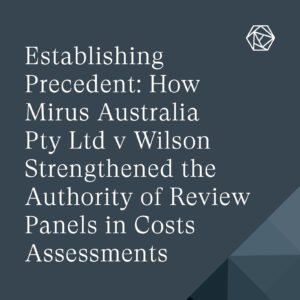
In legal costs assessment, precedent plays a vital role in shaping both strategy and expectations. One case that continues to influence how legal professionals approach costs reviews is the Supreme Court decision in Mirus Australia Pty Ltd v Wilson [2023] NSWSC 1432. Though not recent, this landmark decision remains a cornerstone authority in understanding the powers of review panels within legal cost assessments.
At Rose Legal, we believe that knowledge of key legal precedents is essential for both solicitors and clients navigating cost disputes. Our role as trusted legal cost consultants in Sydney and Melbourne means not only applying current law but understanding how cases like Mirus Australia continue to guide complex assessments.
The Case at a Glance
The crux of Mirus Australia Pty Ltd v Wilson revolved around a critical question: Can a review panel award costs incurred during the review process itself?
In this matter, Mr. Wilson initiated a costs assessment against Mirus Australia Pty Ltd, leading to an initial determination awarding him $222,259.66. Unsatisfied with the outcome, Mirus, under the guidance of Rose Legal, sought a review of the decision. The review panel successfully reduced the payable amount by 42%, bringing it down to $128,715.93.
However, while the panel adjusted the primary costs, it held that it lacked the authority to order Mr. Wilson to pay Mirus’s legal costs incurred during the review process—a significant limitation on cost recovery.
Clarifying the Powers of Review Panels
Challenging this interpretation, Rose Legal advised Mirus to escalate the matter to the Supreme Court on a point of law, focusing on sections 78 and 85 of the Legal Profession Uniform Law Application Act 2014 (NSW):
• Section 78: Outlines a costs assessor’s role in determining the costs of an assessment and who is responsible for payment.
• Section 85(2): States that a review panel assumes all the functions of a costs assessor during the review process.
The Supreme Court, led by Justice Campbell, confirmed that review panels do indeed have the power to award costs for the review process. His Honour emphasised that denying this authority could unjustly burden parties who rightfully challenge initial assessments.
“A review panel has power on the determination of a review not only to determine the costs of a first-instance assessment but also the costs of the review itself and by whom they are payable.” — Justice Campbell
Why This Decision Still Matters
For legal practitioners and clients alike, the Mirus case solidifies a crucial right: the ability to recover costs incurred during a review application. This principle remains particularly relevant for firms that regularly navigate cost disputes and wish to ensure that challenging an unfavourable assessment does not result in further financial disadvantage.
For clients, this case illustrates the value of engaging experienced legal cost consultants who understand not only current law but the precedents that continue to shape the landscape of cost assessments.
While Mirus Australia Pty Ltd v Wilson is no longer a headline case, its significance endures. At Rose Legal, we use these foundational decisions to guide clients through the complexities of cost recovery, ensuring every opportunity for maximising returns is explored.
